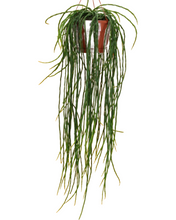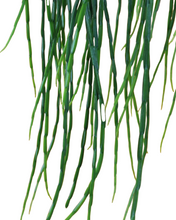Rhipsalis paradoxa is part of the Cactaceae family and its native range is SE. & S. Brazil. There is often some confusion between species and subspecies as they look so alike. ‘Minor’ is most likely Rhipsalis pacheco-leonis subsp. Catenulata. Their pendulous branches are thicker (but not as thick as R. paradoxa) than most other rainforest cacti and resemble a chain. This chaining appears more tightly when the plant is grown in more light. Blooms are small and emerge from the areoles, they are brownish-yellow in colour.
Genus name comes from the Ancient Greek, meaning wicker work, this is in reference to the branches which appear to interlace as they hang.
Pot size: ø 21cm.
Height: Approximately 50cm in length.
Light: Bright indirect light, meaning the plant sees the sun for 0-4 hours per day - this could be through trees or a translucent curtain, it’s important for the plant to see the sky in order to thrive. In its natural environment this plant would receive dappled light.
Water: With adequate light and a well draining potting mix, allow the top two inches to dry out before watering.
Potting mix: A well draining, chunky mix composed of a small amount of coco coir, perlite or vermiculite, orchid bark, horticultural grit and worm castings; you could also add some horticultural charcoal to this epiphytic mix.
Fertilising: Feed your plant with a cactus fertiliser every few waterings during the growing season or when you observe active growth. You can dilute fertiliser to half the recommended amount but never add more.
Temperature: 18-24˚C.
Humidity: Rhipsalis would prefer higher humidity but do well to adapt to average home humidity. You can increase humidity by placing the plant on a watered pebble tray or using a humidifier.
Rhipsalis are non-toxic, keep out of reach of pets and children.



